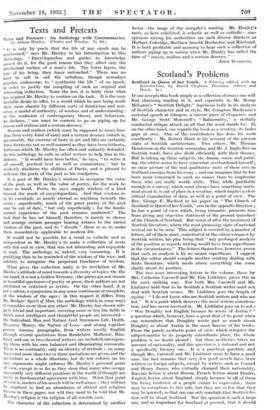Texts and Pretexts
Texts and Pretexts : An Anthology with Commentaries. By Aldous Huxley. (Chat° and Windus. 7s. 6d.) "IT is only by poets that the life of any epoch can be synthesized," says Mr. Huxley in his Introduction to this Anthology. "Encyclopaedias and guides to knowledge cannot do it, for the good reason that they affect only the intellectual surface of a man's life. The lower layers, the core of his being, they leave untouched." There was no need to call in aid the nebulous, though nowadays popular, endeavour, to "synthesize the life" of an epoch, in order to justify the compiling of such an original and interesting collection. None the less, it is fairly clear what Las inspired Mr. Huxley to venture on the task. It is the very laudable desire to offer, to a world which he sees being made daily more chaotic by different sorts of fanaticism and non- sense, a model of authority, of wisdom and of understanding : in the confusion of contemporary theory and behaviour, he declares, "one must be content to go on piping up for reason and realism and a certain decency."
Reason and "realism (which must be supposed to mean free- dom from every kind of cant) and a certain decency (which is, presumably, the exercise of taste in art and life) are certainly three fortretses not so well manned as they have been hitherto, fortresses which Mr. Huxley has often and valiantly defended. In this anthology he calls in other writers to help him in the defence. "It would have been better," he says, "to write it all oneself, poetical text as well as commentary," but he modestly disclaims the abilities of Dante, and is pleased to welcome the poets of the past as his coadjutors.
It is part of Mr. Huxley's wisdom to recognize the value of the past, as well as the value of poetry, for the work he takes in hand. Poets, he says, supply wisdom of a kind beyond the reach of encyclopaedists. And that wisdom is, in its essentials, as nearly eternal as anything beneath the moon ; superficially, much of the great poetry of the past may be out of date, "but only superficially ; for the funda- mental experience of the past remains unaltered." The task that he has set himself, therefore, is merely to choose and arrange certain passages bearing witness to the varied wisdom of the past, and to " decode " them so as to make them immediately applicable to modern life.
It would not be possible for a mind so catholic and so independent as Mr. Huxley's to make a collection of texts with this end in view, that was not interesting and enjoyable to read. The anthology is, indeed, very reassuring. It is gratifying thus to be reminded of the wisdom of the wise, and salutary to recognize the perpetual timeliness of wisdom.
What gives the collection unity is its revelation of Mr. Huxley's attitude of mind towards a diversity of topics. On the one hand, it is not a Golden Treasury ; the pieces are not chosen as beautiful specimens of poetry or prose, their authors are not exhibited or eritieized as artists. On the other hand, it is not a catena, a symposium in any sense continuous or complete, of the wisdom of the ages ; in this respect it differs from Dr. Bridges' Spirit of Man, the anthology which in some ways it resembles more than any other. Mr. Huxley has chosen sub- jects trivial and important, covering more or less the fields in Which most intelligent and thoughtful people are interested— the Individual, Man and Nature, God, Strenuous Life, Death, Progress, Money, the Nature of Love—and strung together poems, stanzas, paragraphs, from writers mostly English (though several quotations from Baudelaire, Mallarme, Rim- baud, and one or two classical writers, are included) interspers- ing them with his own balanced and illuminating comments. There is no continuity, only an identity of attitude ; on many topics not more than two or three quotations are given, and the quotations as a whole illustrate, but do not enforce (as his own arguments might enforce) Mr. Huxley's personal point of view, except in so far as they show that many who occupy apparently very different positions in the world of thought are really in fundamental agreement with him. What that point of view is, readers of his novels will be well aware ; they will not be surprised to find an abundance of ethical and religious lessons in these pages, nor will they need to be told that Mr. Huxley's religion is the religion of all sensible men.
The character of the collection is determined by another
factor—the range of the compiler's reading. Mr. Htudey'e taste, as here exhibited, is eclectic as well as catholic : con- spicuous among his authorities are such diverse thinkers as Herbert, Coleridge, Matthew Arnold, Rochester, and Rimbaud., It is both profitable and amusing to hear such a collection of authors piping up in unison when Mr. Huxley has called the tune of" reason, realism and a certain decency."
Jomr SrAnnour.
































































 Previous page
Previous page